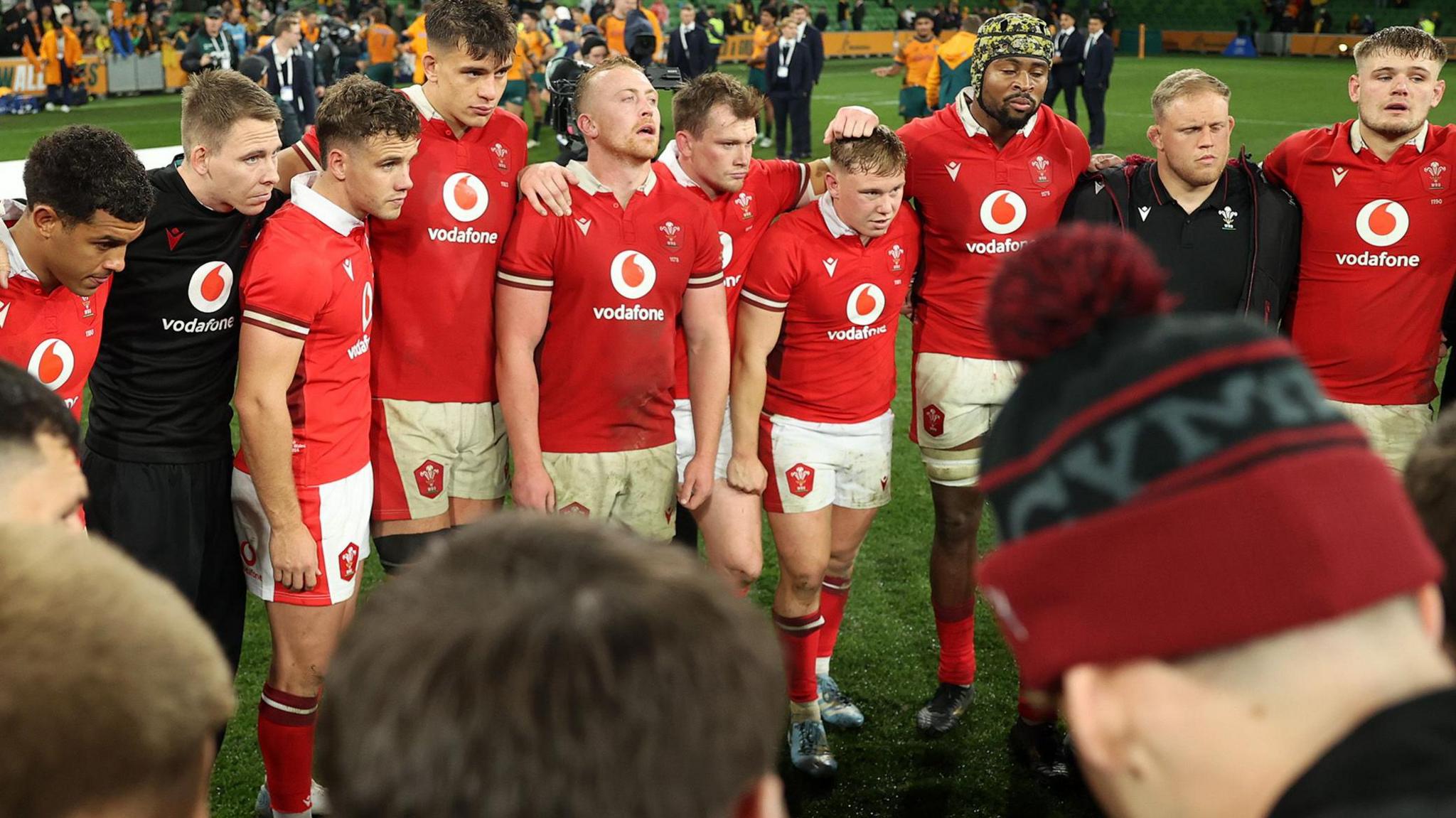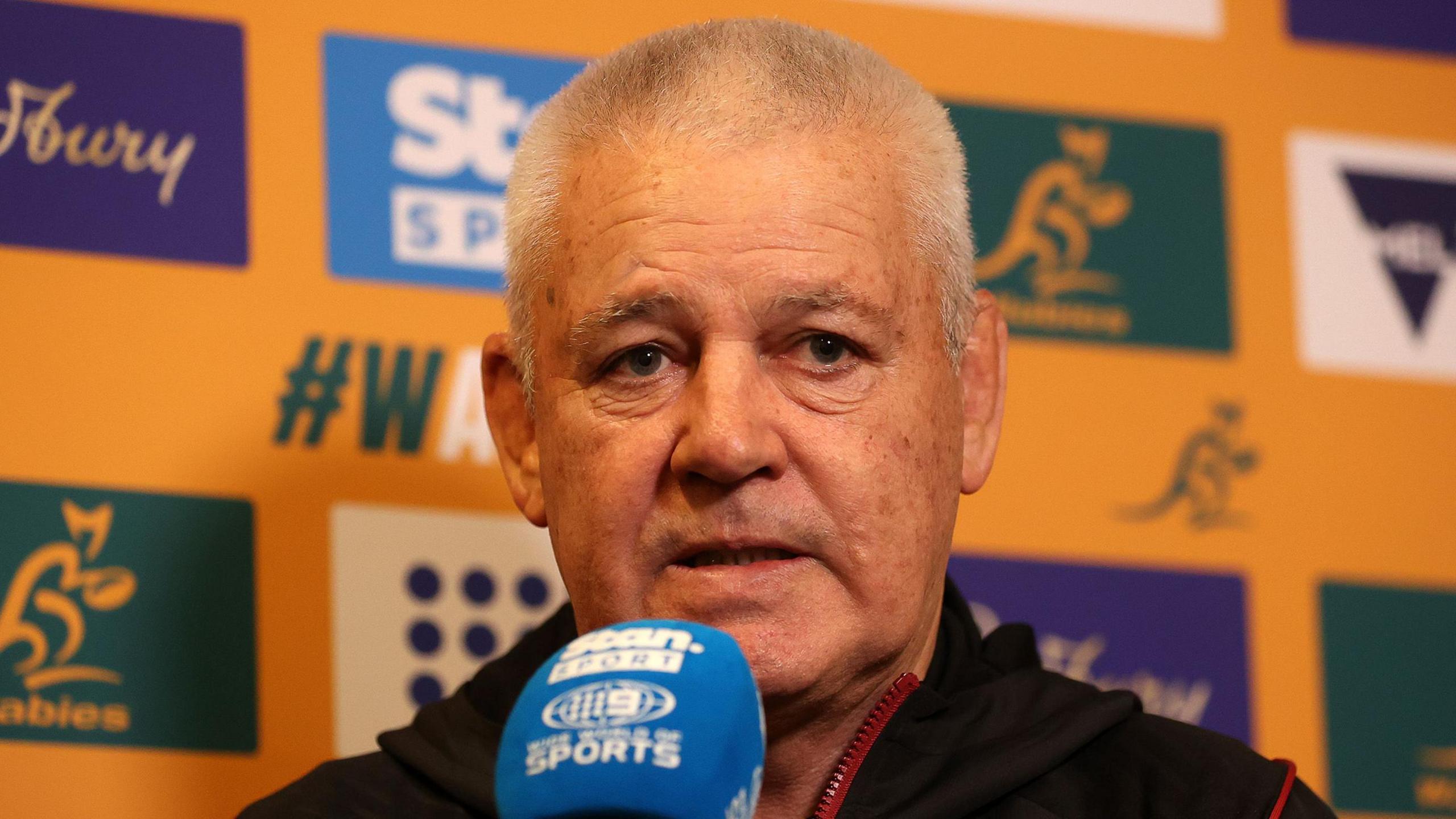Long goodbye to testing Wales international season

Wales were dejected after losing the second Test against Australia in Melbourne
- Published
Finally it's over. Another rollercoaster year of international rugby for Wales has come to an end.
There might be one more friendly against Queensland Reds in Brisbane on Friday to complete the campaign but the main business of the Test calendar has finished.
It has been almost a year since Warren Gatland's side started one of the longest seasons in history with a 20-9 win against England in a World Cup warm-up match on the first weekend of August.
The curtain was brought down in mid-July with a 36-28 defeat against Australia in Melbourne.
Wales might have produced their finest display of a desperate 2024 but could not stop the Wallabies wrapping up the series 2-0.
There have been the relative highs, such as when Wales won their World Cup pool, including one of their finest performances in the 40-6 hammering of Australia in Lyon.
Since then it has been a rapid decline with nine successive Test defeats, which has included finishing bottom of the Six Nations for the first time since 2003.
Results and records matter
Wales started the season ninth in the world rankings and finished 11th, their lowest ever position as they dropped out of the top 10 for the first time since they were first published in 2003.
Gatland's side have played 16 Tests during the campaign with 11 defeats and five victories.
The losses have been against England (twice), South Africa (twice), Australia (twice), Argentina, Ireland, France, Scotland and Italy.
Four of the wins came in the World Cup against Fiji, Australia, Georgia and Portugal before the quarter-final defeat against the Pumas.
Wales have not won a Test since defeating Georgia last October so they will go more than 12 months without an international victory, with the next game against Fiji in November in Cardiff.
They will be desperate to win that game because a 10th defeat would equal Wales' record losing sequence of Steve Hansen's side of 2002 and 2003.
Gatland has hunger to turn struggling Wales around
- Published13 July 2024
Gatland wants Wales selection option for Hawkins
- Published11 July 2024
Gatland still has points to prove

Warren Gatland has led the British and Irish Lions three times
Former Welsh Rugby Union (WRU) chief executive Steve Phillips brought Gatland back in December 2022 to replace Wayne Pivac, who paid the price for home losses against Italy and Georgia.
Gatland was returning after his first 12-year stint during which Wales won three Grand Slams and four Six Nations titles and reached two World Cup semi-finals.
The encouraging 2023 World Cup has made way for the nine-match losing run - the longest sequence of games under Gatland without a Test victory.
The Australia loss in Melbourne was a 15th defeat in 21 Tests since he returned.
It is a win ratio of 29%, similar to the stint he had with the Chiefs in New Zealand after he initially left the Wales role in 2019.
Following the Six Nations loss to Italy, which cemented a clean sweep of defeats in the tournament for the first time in 21 years, Gatland revealed he had offered his resignation to Phillips' successor Abi Tierney in the changing room after the game.
That was turned down and subsequently Tierney, who Gatland reports to, and WRU executive director of rugby Nigel Walker backed the coach to take Wales to the World Cup in 2027.
Following defeat in Melbourne, Gatland insists he has the hunger for the challenge.
Questions remain about whether he knows his best side and what style of play he is trying to enforce, although the well-worked Liam Williams team try showed a glimpse of what is possible.
Guiding this side back towards the top of the global game before the 2027 World Cup in Australia could rank as Gatland's greatest achievement.
Changing of the guard
There was a period when you could almost name Gatland's match-day 23. Those days are gone.
He has had to contend with losing a host of players from Wales' golden generation and a number of high-profile injuries during the campaign.
Alun Wyn Jones, Justin Tipuric and now-banned Rhys Webb retired from international rugby before the World Cup, while George North, Dan Biggar, Leigh Halfpenny joined them after the tournament.
Taulupe Faletau, Jac Morgan, Dewi Lake, Tomos Francis, Liam Williams and Gareth Anscombe were missing for the Six Nations.
Faletau, Morgan, Anscombe and Adam Beard were also absent during the summer tour because of injury, while Ryan Elias, Josh Adams and Will Rowlands were rested and Francis continued to be absent after moving to play club rugby in France.
So Gatland has been without some of his top players for long stints and has used 64 players in the 16 internationals this season.
The Wales head coach fielded a starting forward pack of just 112 caps in the final game against Australia, 23 fewer than the Wallabies skipper James Slipper.
Gatland has baffled some with his selections, including the continued omission of Morgan Morris and Nicky Smith and decisions such as playing Mason Grady out of position at inside centre.
He is determined to stick with his policy of blooding young players who have little experience of Test rugby or winning at that level.
Bath prop Archie Griffin remarkably made his first professional start in Wales' first-Test defeat by the Wallabies in Sydney.
Gatland has asked for patience from the Welsh public and maintains Wales will develop into a very good side and there have been some encouraging signs in Australia.
He claims other nations would not want to face them in the 2027 World Cup, citing a forward pack including the likes of Griffin, Lake, Morgan, Aaron Wainwright, Dafydd Jenkins and Christ Tshiunza coming into their prime.
Short-term pain for long-term gain has been the recurring message.
Have Wales found their leader?
Dewi Lake: Warren Gatland and Joe Schmidt praise Wales captain
The major success story of Wales' summer series has been captain Lake who has led by example on and off the field.
Lake was outstanding in the 41-13 defeat by South Africa at Twickenham and the second Test defeat in Melbourne.
He crossed for three tries in those two matches, demonstrating why the rolling maul has become Wales' most effective attacking weapon.
Lake and Morgan were given co-captain roles for the World Cup. Morgan led the side in the big matches as Lake struggled to establish himself as first-choice hooker.
With the Ospreys pair missing the Six Nations, Exeter lock Jenkins took the leadership reins, becoming Wales' second youngest captain after Sir Gareth Edwards.
After Morgan suffered a fresh hamstring injury, Gatland turned to Lake to lead the squad this summer.
The Wales coach says he has three outstanding young leaders in Lake, Morgan and Jenkins to take them through to the World Cup.
But Lake is the man in possession and has demonstrated perhaps he is the most natural option.
What does the future hold?
There will be the matter of defeating Fiji in the opening autumn game to avoid becoming an unwanted part of Welsh rugby history.
Especially with further November matches against Australia and world champions South Africa, before three away trips in next year's Six Nations, starting with France in Paris.
Off the field, the WRU is planning to reveal their overall strategy for the struggling Welsh game.
The relative success of the international side has often papered over Welsh rugby's cracks, but no more.
Gatland's "Team Wales" set-up has sometimes had an uneasy relationship with the nation's four professional sides.
That has to stop if Wales are to return to being a successful nation. No more them and us.
Tackling the future together is the only way to avoid the sort of struggles witnessed this season.